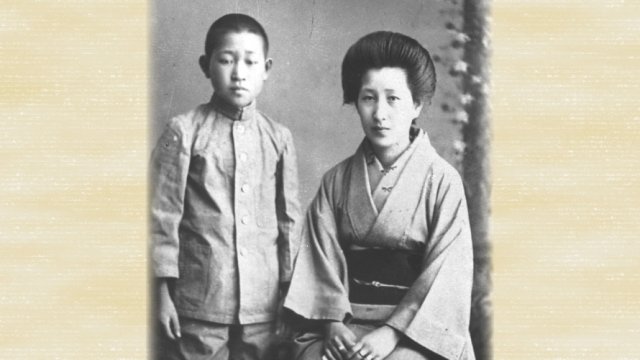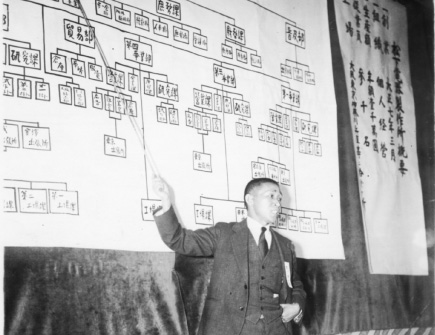
Nov 19, 2025
- Products & Solutions
- Stories
- Konosuke Matsushita
- Technology
- R&D
- Business Policy
- Home & Personal Solutions

One-hundred and eleven years ago, on November 23, 1904, Konosuke Matsushita left his home in Wakayama, stepped from the train at the Osaka Namba station, and headed to the Miyata Hibachi Store on the Hachimansuji line to start his life as an apprentice. That day, Konosuke, who pursued his commitment of being a humble merchant through life, actually entered his career path.
(Photo: Konosuke Matsushita at age of ten with the wife of the owner of Godai Bicycle Shop)
From that day, Konosuke Matsushita spent seven years as an apprentice at the Miyata Hibachi Shop through February 1905 and Godai Bicycle Shop in Semba through June 1910.
In terms of age, it was from 9 to 15. During this period when childhood ends and the personality is formed, he physically rather than theoretically learned what a merchant should be. He reflected on those days this way:
"At the time, Semba could be called Semba College and it was a popular belief that learning how to do business in Semba as an apprentice was the same as taking a study course to become a full-fledged businessman. Naturally, it was a very rough road. In one respect, I am what I am today thanks to those seven years working as an apprentice when I naturally learned the business manners and gained know-how from my experience." (An excerpt from "Hard but good old apprenticeship days" in 100 Great Figures in Osaka, 1968*)
In particular, during the five years working as an apprentice at the Godai Bicycle Shop, Konosuke seemed to have found the owner Otokichi Godai to be an ideal person in terms of what a merchant should be. In his book titled Dream of Work Dream of Life,* he described what kind of person Godai was in concrete terms, with words of appreciation, "Looking at how this man does business, I found that he is a highly-gifted person."
Specifically, Godai would respond to customers who insisted on lower prices by saying with firm conviction, "This is the lowest I can go. I set this price very carefully. If I make it any lower, I will make no money. I will not sell anything unless I make money for myself. No business can last long that way and I will also be unable to provide services."
At the same time, Konosuke gave this description of Godai: "It was his policy that a businessman must handle valued customers with a grateful heart and whenever they need help, should rush over to help. Therefore, he was always making himself ready to serve customers."
Time passed. In November 1935, the month before incorporation of the company as Matsushita Electric Industrial Co., Ltd., Konosuke established Basic Internal Rules which included Article 15 "No matter how large Matsushita Electric might become in the future, maintain the attitude of being a humble merchant. Think of yourself to be employed in a small shop. Be simple, frugal and humble as you carry out your work." The keystone of this provision is "the attitude of being a humble merchant" and without a doubt the founder learned this from his experience in Semba as described above.
Ever after, whenever and wherever the occasion arose, he kept sending a wake-up call to employees by asking, "Do you remember you are a merchant?" For example, through the Atami Conference in 1964 he intensified autonomous responsible management by business divisions and launched a new sales system. On that occasion, he strongly emphasized "being a merchant."

Explaining the business division system in 1935
At the Welcoming Ceremony for New Employees, President Kazuhiro Tsuga shared "Maintain the attitude of being a humble merchant" as "the founder, Konosuke Matsushita's words he had meditated on recently." He said, "Each of us should give careful consideration to these words, which represent the roots of Panasonic. This applies to employees in all areas, including sales and marketing, technology development, and back-office operation."
Even at today's Panasonic, each and every employee commits themselves to interpret and pursue "the attitude of being a humble merchant" in their respective positions and carry out their daily work accordingly.
*Available in Japanese only
The content in this website is accurate at the time of publication but may be subject to change without notice.
Please note therefore that these documents may not always contain the most up-to-date information.
Please note that German, Spanish and Chinese versions are machine translations, so the quality and accuracy may vary.